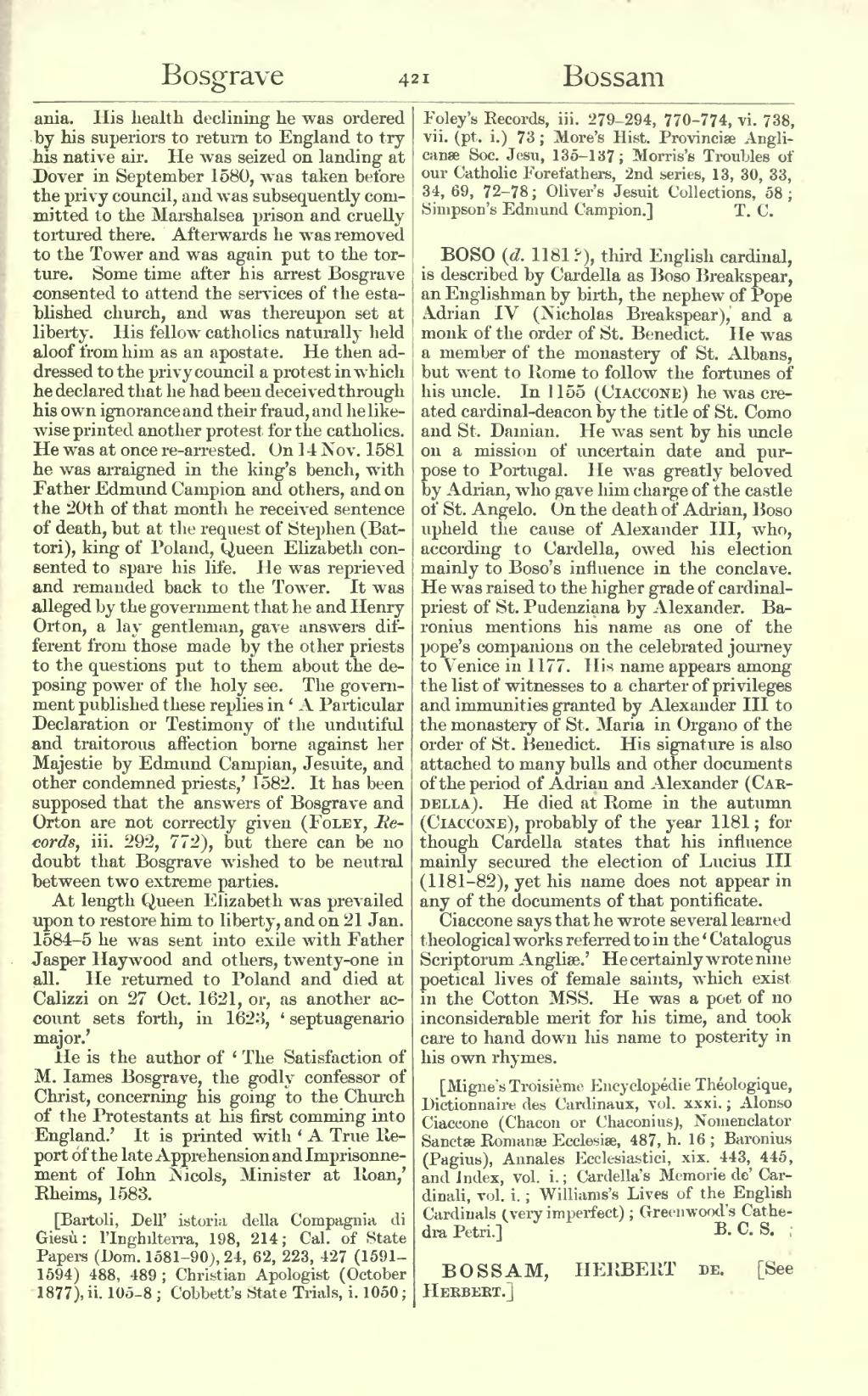ania. His health declining he was ordered by his superiors to return to England to try his native air. He was seized on landing at Dover in September 1580, was taken before the privy council, and was subsequently committed to the Marshalsea prison and cruelly tortured there. Afterwards he was removed to the Tower and was affain put to the torture. Some time after his arrest Bosgrave consented to attend the services of the established church, and was thereupon set at liberty. His fellow catholics naturally held aloof from him as an apostate. He then addressed to the privy council a protest in which be declared that he had been deceived through bia own ignorance and their fraud, and he likewise printed another protest for the catholics. He was at once re-arrested. On 14 Nov, 1681 be was arraigned in the king's bench, with Father Edmund Campion and others, and on the 20th of that month he received sentence of death, but at the request of Stephen (Battori), king of Poland, Queen Elizabeth consented to spare his life. He was reprieved and remanded back to the Tower. It was alleged by the government that he and Henry Orton, a lay gentleman, gave answers different from those made by the other priests to the questions put to them about the deposing power of the holy see. The government published these replies in 'A Particular Declaration or Testimony of the undutiful and traitorous afiection borne against her Majestie by Edmund Campian, Jesuite, and other condemned priests,' 1582. It has been supposed that the answers of Bosgrave and Orton are not correctly given (Foley, Records, iii. 292, 772), but there can be no doubt that Bosgrave wished to be neutral between two extreme parties.
At length Queen Elizabeth was prevailed upon to restore him to liberty, and on 21 Jan. 1684-5 he was sent into exile with Father Jasper Haywood and others, twenty-one in all. He returned to Poland and died at Calizzi on 27 Oct. 1621, or, as another account sets forth, in 1628, 'septuagenario major.'
He is the author of 'The Satisfaction of M. James Bosgrave, the godly confessor of Christ, concerning his going to the Church of the Protestants at his first comming into England.' It is printed with 'A True Report of the late Apprehension and Imprisonnement of John Nicols, Minister at Roan,' Rheims, 1583.
[Bartoli, Dell' istoria della Compognia di Giesù: l'Ighilterra, 198, 214; Cal. of State Papers (Dom. 1581-90), 24, 62, 223, 427 (1691-1694) 488, 489 ; Christian Apologist (October 1877), ii. 105-8 ; Cobbett's State Trials, i. 1060 ; Foley's Records, iii. 279-294, 770-774, vi. 738, vii. (pt, i.) 73 ; More's Hist. Provinciæ Augliainæ Soc. Jesu, 136-137; Morris's Troubles of our Catholic Forefathers, 2nd series, 13, 30, 33, 34, 69, 72-78 ; Oliver's Jesuit Collections, 58 ; Simpson's Edmund Campion.]
BOSO (d. 1181?), third English cardinal, is described by Cardella as Boso Breakspear, an Englishman by birth, the nephew of Pope Adrian IV (Nicholas Breakspear), and a monk of the order of St. Benedict. He was a member of the monastery of St. Albans, but went to Rome to follow the fortunes of his uncle. In 1165 (Ciaccone) he was created cardinal-deacon by the title of St. Como and St. Damian. He was sent by his uncle on a mission of uncertain date and purpose to Portugal. He was greatly beloved by Adrian, who gave him charge of the castle of St. Angelo. On the death of Adrian, Boso upheld the cause of Alexander III, who, according to Cardella, owed his election mainly to Boso's influence in the conclave. He was raised to the higher grade of cardinal-priest of St. Pudenziana by Alexander. Baronius mentions his name as one of the pope's companions on the celebrated journey to Venice in 1177. His name appears among the list of witnesses to a charter of privileges and immunities granted by Alexander III to the monastery of St. Maria in Organo of the order of St. Benedict. His signature is also attached to many bulls and other documents of the period of Adrian and Alexander (Cabdella). He died at Home in the autumn (Ciaccone), probably of the year 1181 ; for though Cardella states that his influence maimy secured the election of Lucius III (1181-82), yet his name does not appear in any of the documents of that pontificate.
Ciaccone says that he wrote several learned theological works referred to in the 'Catalogs Scriptorum Angliæ.' He certainly wrote nine poetical lives of female saints, which exist in the Cotton MSS. He was a poet of no inconsiderable merit for his time, and took care to hand down his name to posterity in his own rhymes.
[Migne's Troisième Encyclopedie Théologique, Dictionnaire des Cardinaux, vol. xxxi. ; Alonso Ciaccone (Chacon or Chaconius), Nomenclator Sanctæ Romanæ Ecclesiæ, 487, h. 16 ; Baronius (Pagius), Annales Ecclesiatici, xix. 443, 445, and Index, vol. i. ; Cardella's Memorie de' Cardinali, vol. i. ; Williams's Lives of the English Cardinals (very imperfect) ; Greenwood's Cathedra Petri.]
BOSSAM, HERBERT dc. [See Herbert.]
